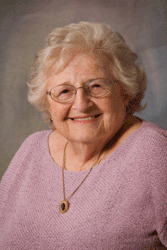Mathilda B. Canter
Born in Brooklyn is 1924 Mathilda B. Canter earned her bachelor's degree in sociology from Brooklyn College and completed all the requirements for a sociology master's degree at Columbia University except for her thesis. While working on it in 1944 she married psychologist Army Air Corps Sgt. Aaron Canter and they moved to Arizona in 1949. While staying home to raise her two children Rachelle and Steven once they were both in school, she began taking two psychology courses each semester at Arizona State University (ASU). She earned her MA. In psychology in 1961 and her Ph.D. in 1965 the second woman to receive a Ph.D. from ASU in any field. Following an internship at the Phoenix Veterans Hospital she started a practice as a clinical psychologist in Phoenix in 1966. An active member of the Arizona Psychological Assn. Dr. Canter was appointed to the Arizona State Board of Psychologists Examiners in 1976 and was elected chair at her first meeting. She spearheaded a movement that resulted in the first legal stipulation that permitted certified psychologists to "diagnose treat and correct human conditions ordinarily within the scope and practice of a psychologist". By 1978 the previously split community of mental health professionals became a united front resulting in the establishment of a statute requiring a doctoral degree for certification permitting the national examination expanding disciplinary options and increasing fees. The statute also allowed Arizona to join the American Association of State Psychology Boards (AASPB). Canter was elected to the AASPB board in 1980 and immediately wrote the Sunset Review Preparation Guide which was based on the Arizona Board's very successful review by the legislature for circulation to all the state boards. She received the 1986 AASPB Roger C. Smith award for valuable contributions to the regulation of psychologists and the practice of the profession. She served on the Arizona Board until 1986. Dr. Canter is a Fellow of numerous Division of the American Psychological Association (APA) has served as a member of the APA Board of Directors and been elected to multiple terms on the APA Council representing the Divisions of Psychotherapy (29) and Independent Practice (42). Using the experience, she gained while chairing the American Psychological Association's Ethics Committee; she went on to chair its Revision Comments Subcommittee which finalized the Ethical Principles and Code of Conduct adopted by the APA Council in 1992. Canter is frequently consulted on ethical issues. She was responsible for the conception initiation and coordination of the reference book Ethics for Psychologists: A Commentary on the APA Ethics Code. She has served on the APA Policy & Planning Board which she chaired the Membership Committee and the Committee for the Advancement of Professional Practice. She was elected in 1984 as the first female president of the APA Division of Psychotherapy (29) and in acknowledgement of her achievements Division 29 named a student research competition award for her and honored her with the Distinguished Psychologist Award for Contributions to Psychology. Dr. Canter also received the Division 42 Psychologist of the Year Award was elected as a Distinguished Practitioner of the National Academies of Practice in 1990 and earned the APA Karl E. Heiser Advocacy Award for her work in Arizona. Other awards include the 2000 APA Award for Distinguished Contributions to Applied Psychology as a Professional Practice the 2002 American Psychological Foundation Gold Medal for Life Achievement in the Practice of Psychology a Doctor of Humane Letters from the Pacific Graduate Institute (2004) an APA Presidential Citation in 2005 and the Jerry Clark Award for Advocacy from the Association for the Advancement of Psychology in 2007. Arizona honors include the Distinguished Psychologist Award (1978) and the Aaron Canter Award for Distinguished Contributions to Professional Psychology(1999) from the Arizona Psychological Association; an Arizona Psychological Foundation dinner (2005) honoring her as First Lady of Arizona Psychology honored by the Maricopa and Scottsdale Psychological Societies and Camelback Psychiatric Hospitals for endeavors as a practitioner consultant and leader in the profession on local state and national levels (1988;) Valley of the Sun Minerva Award of AWARE International (Association for Women's Active Return to Education) (1972) for service to women. Dr. Canter who holds the lowest numbered active license in Arizona (#8) is semi-retired limiting her practice to psychotherapy with a small number of adult individuals and couples. Her many current professional activities include serving as President of the Arizona Psychological Association (2008) representing Arizona on the American Psychological Association's Council of Representatives and serving a third term on the APA's Policy and Planning Board. In her spare time, she enjoys classical music theater reading and seeing family and friends.



